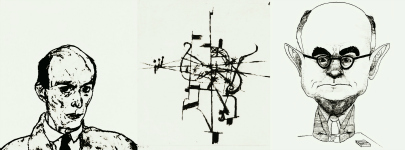Schönberg/Adorno
-
31 January 2016, 19:00


In partnership with Goethe-Institut Moskau and Stanislavsky Electrotheatre
The relationship between Arnold Schönberg and Theodor Adorno has a historical meaning that goes beyond the biographical level. In his lecture, the musicologist Golan Gur (Cambridge) explores the relationship between the two, focusing on Adorno’s attempt to develop a philosophy of music that highlights the role of New Music as a medium of cultural critique. In the process, Golan Gur will discuss the main stages in Schönberg’s compositional path and the extent to which they were subjected to various historical and philosophical interpretations.

Moscow Contemporary Music Ensemble presents Arnold Schönberg’s String Quartet #4 and Six Studies for String Quartet by Theodor W. Adorno, performed (premiere in Russia) by FX Quartet.
Entrance free of charge, online registration is required.
_______________________
Golan Gur is a musicologist specializing in aesthetics and cultural history of music, with a particular emphasis on nineteenth- and twentieth-century German and Austrian culture and the intersection between historical and interdisciplinary research approaches. He studied musicology and music theory at Tel-Aviv University and at the Ludwig Maximilian University of Munich. He completed his doctoral studies at the Humboldt University of Berlin under the supervision of Christian Kaden in the field of music sociology and social history of music. Golan Gur is presently a Newton Fellow at Cambridge University and a member of the research project on music in GDR. He taught at Tel-Aviv University, at Humboldt University and at Berlin University of Arts. He was a visiting scholar at the Simon Dubnow Institute of Leipzig University and the Paul Sacher Stiftung, Basel. His first book, Orakelnde Musik. Schönberg, der Fortschritt und die Avantgarde, deals with Arnold Schoenberg and avant-garde notions of musical progress.
FX Quartet was founded in 2009 and has gained a reputation of an ambitious and experimental ensemble. Its main goal is performance and promotion of contemporary academic music. FX-Quartet participated in many festivals: Night at the Museum, Art November, Afisha Picnic, Usadba Jazz, International Media Performance Festival, Moscow Autumn. The quartet collaborates with a lot of musicians and composers: Iraida Yusupova, Dilyara Gabitova, Olesya Rostovskaya, Vera Ivanova, Alexey Sysoev, Alexey Shelygin, Dmitry Pokrovsky Ensemble, Pompeya band and Moscow Contemporary Music Ensemble (MCME).
Eugene Subbotin, violin
Artur Adamyan, violin
Shamil Saidov, viola
Ilya Rubinstein, cello
Moscow Contemporary Music Ensemble (MCME) was founded in 1990 by Yuri Kasparov, under the patronage of the famous Russian composer Edison Denisov. The ensemble focuses on promoting 20th and 21st century music. It is Russia’s foremost contemporary chamber ensemble and consists of some of the best Russian musicians specializing in modern music. MCME has strong educational goals and works closely with both Russian and international cultural foundations to bring contemporary music to a wide range of audiences. As part of this goal, MCME has organized the International Young Composers Academy (Tchaikovsky City, Ural) to bring together both young composers and internationally recognized composers in workshops. MCME has recorded more than 40 CDs for leading labels, including Olympia (UK), Harmonia Mundi (France), Triton (Japan), Donemus (The Netherlands), Fancymusic (Russia), etc.
-
Adorno's Six Studies for String Quartet
-
Schoenberg. String Quartet #4
-
Schoenberg. String Quartet #4
-
Schoenberg and Adorno
-
Schoenberg/Adorno: critical composition
-
Schoenberg/Adorno: critical composition (Russian translation)
-
Adorno. Six Studies for String Quartet
-
Schoenberg. String Quartet #4 (parts 1 and 2)
-
Шенберг/Адорно

